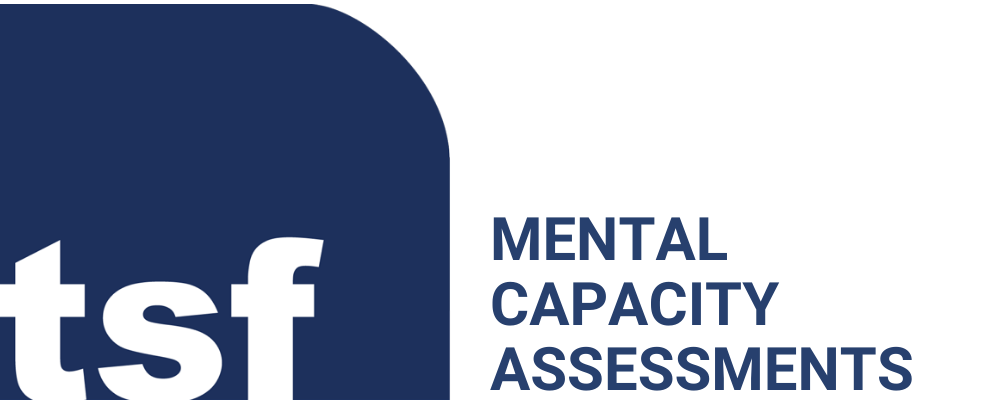Mental Capacity Assessments
Our team of experienced mental capacity assessors come from a range of different professional backgrounds, including social work, mental health nursing, learning disabilities nursing, general nursing, speech and language therapy and occupational therapy. This means that we can match your requirements with an assessor that is right for your
mental capacity assessment requirements. If you would like to discuss any of our services in further detail, we would be happy for you to contact us at this number:
0333 577 7020
OUR SERVICESWe are recognised in legal and financial sectors as being the leading mental capacity company in England and Wales.
We specialise in assessing mental capacity for a range of financial decisions.
Our most popular assessments are:
We pride ourselves on exceeding expectations to provide our clients with an excellent service.
A mental capacity assessment play a crucial role in determining whether an individual is able to understand, retain, use, weigh and communicate relevant information in order to be able to make a specific decision. Continue reading as we will explore the concept of mental capacity, delve into the process of mental capacity assessments, discuss their importance, and highlight key considerations.
What is Mental Capacity?
Mental capacity refers to an individual’s ability to understand, retain, and use information to make decisions that impact on their life. Assessment of mental capacity is always in relation to a specific decision: a person may have mental capacity to make one particular decision but not for another type of decision. Often this is dependent on the complexity and amount of information that a person needs to understand in order to make that decision.
At TSF, we use the term “threshold of understanding” to set out what a person might need to understand in order to make the specific decision. As well as understanding relevant information, a person will need to be able to consider and weigh the pros and cons of different options or of making the decision, and the consequences and risks attached to it. A person’s mental capacity can fluctuate so it is important to assess someone at a time when they are most likely to be able to make the decision in question, where this is possible, particularly for “one off” decisions.

The Mental Capacity Assessment Process
At TSF, you will be allocated a Client Liaison Officer who will be your point of contact from initial enquiry through to receipt of your completed mental capacity assessment report. The Client Liaison Officer will assist you in gathering relevant background and referral information so that the assessor has a good understanding themselves of the exact decision that the person needs to make. All of our mental capacity assessments are completed by qualified and registered health professionals, such as nurses, social workers, speech and language therapists and occupational therapists.
The assessment ‘interview’ is based around a conversation, with the assessor asking questions to ascertain whether the person is able to understand, use, weigh, retain and communicate relevant information in order to be able to make the decision in question. Therefore, the majority of questions that the assessor will ask are questions relevant to the decision that needs to be made (the decision for which the person is being assessed). For example, in a property and financial mental capacity assessment, the conversation between the assessor and the individual will focus on questions relevant to how the person is able to manage their money; what they understand about the banking process and how money is kept safe; what they understand about their income, outgoings and budgeting; their understanding of relative values; using GBP currency and consequences of getting into debt.

The Importance of Mental Capacity Assessments
It should always be assumed that a person has capacity to make a decision. This is the starting point of any mental capacity assessment. However, where there is a question mark over a person’s ability to make a specific decision, due to them not being able to understand, retain, use or weigh relevant information or communicate their decision, and where that person has a cognitive impairment (this does not have to be a diagnosed impairment), a mental capacity assessment should be undertaken to ascertain whether the person is able to make the decision in question.
If the outcome of the assessment is that the person has capacity to make the decision, our reports will evidence this and the person can proceed with making the decision. If the outcome of the assessment is that the person lacks capacity to make the decision in question, then our reports can then be used to evidence an outcome of lack of capacity. In such circumstances, if proceeding with the decision in question, this would need to be made in the person’s best interests.
If it is found that a person does not have capacity to act in a specific role, such as acting as an executor or trustee, then a legal professional can assist with appointing someone else to carry out this role. If the person is not able to make a Will or manage their own finances, then it may be that an application to the Court of Protection is necessary so that a statutory Will can be made or to appoint a Deputy to manage the person’s finances in their best interests. If the person is not able to make a decision about an equity release mortgage but has a valid LPA, then their attorney would be able to make this decision on their behalf. If a person lacks capacity to litigate in legal proceedings, then our assessment would provide evidence that would enable a Litigation Friend to be appointed to ligate on behalf of that person.

What makes a Mental Capacity Assessment from TSF different?
Sometimes a person will require specific support to facilitate communication or to aid understanding. Our assessors are skilled at tailoring assessments according to the support needs of each individual person, ensuring that Principle 2 of the Mental Capacity Act is adhered to (that individuals should be supported to make their own decisions wherever possible). This might mean that a person needs to have visual prompts or communication aids to hand, is able to write down information or view information in a simplified or pictoral format to aid understanding. Our assessments are always person-centred and tailored to an individual’s specific circumstances.
An assessment can be completed either face-to-face or virtually via video-link. As well as the conversation with the person who needs to make the decision in question, the assessment may also include consultation with family members or caregivers, in order to obtain as full a picture as possible of how the person is able to function day to day where they may be faced with having to make decisions relevant to the matter being assessed. The assessor then carefully documents their findings, either in a letter, or in a full report format (as instructed by the client) which will evidence whether the person has capacity to make the decision in question.

Face-to-face and video link assessments
Our team of expert Mental Capacity Assessors conducts both face to face and remote video-link assessments across England and Wales. We are qualified and experienced in assessing a person’s mental capacity on a wide range of specific decisions.
Unrivalled Expertise
Simple Process
5-star reviews

What We Do
Meet the team
Client Liaison Officer
Joanne
Mental Capacity Assessor
Barry
Mental Capacity Assessor
Beth
Client Liaison Officer
Denise
Clinical Lead
Vicki
Mental Capacity Assessor
Naomi
Joanne
Client Liaison Officer
Barry
Mental Capacity Assessor
Beth
Mental Capacity Assessor
Denise
Client Liaison Officer
Vicki
Clinical Lead
Naomi
Mental Capacity Assessor
Related blog posts
Get in touch
Work for Us
We are always interested in hearing from talented individuals who are passionate about mental capacity.


